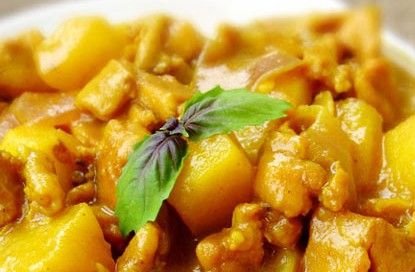Nutrition and delicious curry benefits
Curry is a sauce made from a variety of spices. It is commonly found in Indian, Thai and Japanese cuisines. It is usually eaten with meat and rice. Now, we are familiar with the curry is generally defined as fresh and dry spices with oil saute, and add onion puree, garlic, ginger boiled together. Among them, spices are not limited, and most are peppers, fennel, coriander, and curcumin. Curry can not only be used to cook a variety of food, but also has the health effect and role. Curcumin is one of the important ingredients in curry powder and it has very good health benefits. In Indian herbal medicine, curcumin plays an important role. It is often used as an antiseptic to treat cuts, burns and bruises. The study also determined that curcumin can also be used as a nutritional supplement in certain aspects. Curcumin can help treat stomachaches, skin diseases, indigestion and other diseases. Some medical experts also believe that curcumin has the potential to treat Alzheimer's disease, arthritis, and childhood leukemia. Curcumin is also a natural liver antidote that can effectively reduce the side effects of chemotherapy drugs. Recently, curcumin has also been found to promote nerve development. Studies have shown that curcumin contained in curry also protects the heart and prevents heart failure. Curcumin in curry can prevent and reverse cardiac hypertrophy and restore cardiac function. You can benefit from eating health foods made of curry or curry extract three times a week. Curry Nutrition Analysis: 1. The main ingredients of curry are turmeric powder, Sichuan pepper, star anise, pepper, cinnamon, cloves and coriander seeds, etc. They contain spicy spices, which can promote the secretion of saliva and gastric juice, increase gastrointestinal motility and increase appetite; 2. Curry can promote blood circulation and achieve sweating; 3. The American Association for Cancer Research states that curcumin contains curcumin that activates hepatocytes and inhibits cancer cells; 4. Curry also has the function of assisting wound compounding and preventing Alzheimer's disease. Curry Supplementary Information: The curry powder is mainly composed of turmeric, pepper, star anise, cinnamon, pepper, white pepper, cumin, clove, villosum, wolfberry fruit, licorice, mustard, dried ginger, cumin cumin, nutmeg, fenugreek, and more than ten types of spices. According to taste and taste, choose the appropriate ingredients and add fresh hemp leaf when cooking. The mixing ratio is generally 40% for savory spices, 20% for spicy ones, 30% for color toning, and 10% for other (adding fresh hemp leaf and coconut milk when cooking, etc.). The curry powders used in various places have different formulas. They can be divided into Hotcurry powder and Mild curry powder. The former is formulated to increase the weight of pepper, pepper, and ginger, while the latter is relative. Reduce these materials and add more licorice and wolfberry. The commercially available curry powders, whose formula proportions are each considered as trade secrets, do not list the ingredients, or explain the main ingredients of the first and second ingredients. Curry for the crowd: suitable for majority of the people Gastritis, ulcer disease patients eat less, sick during medication should not be eaten. Curry practice guide: 1. The curry should be kept in a sealed place so as to avoid volatile loss of the aroma; 2. It can be used to cook squid, squid, beef, chicken and so on. In addition, curry is a magic weapon for women to lose weight. The spice containing spicy ingredients in curry will stimulate the secretion of saliva and gastric juice and improve digestion and absorption. This spicy taste can also promote blood circulation in the body and achieve the effect of sweating and fever. Injectio,Nursing Andprotective Equipment Henan Anbang Medical Supplies Co., Ltd. , https://www.anbangmedical.com